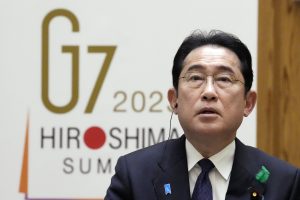Japanese Prime Minister Kishida Fumio was in Africa from April 29 to May 5 for a week-long tour of four countries: Egypt, Ghana, Kenya, and Mozambique. The trip concluded with a meeting with Singaporean Prime Minister Lee Hsien Loong during a refueling stop at Changi airport.
The trip was a vital step in laying the groundwork for the upcoming G-7 Hiroshima Summit, scheduled to take place from May 19 to 21. Amid the global divide exposed by Russia’s aggression in Ukraine, Japan, as the G-7 president, has made it clear that Africa will be the focus of the summit, given that the continent is home to the majority of Global South countries. The visit also sought to bolster relations in regions affected by the actions of China and Russia.
Originally, Kishida had hoped to hold a direct dialogue with African leaders during the eighth Tokyo International Conference on African Development (TICAD 8) in Tunisia in August last year. However, the prime minister came down with COVID-19 just before the meeting, so had to attend virtually. The timing of this visit, rescheduled to coincide with the Golden Week holiday in Japan shortly before the G-7 Hiroshima Summit, appears to have been very deliberate.
During his trip, Kishida reiterated the principle of sovereignty and territorial integrity and the realization of a free and open international order based on the rule of law, values that were also emphasized in the Tunis Declaration adopted at TICAD 8. Although this was an implicit reference to the Russian invasion of Ukraine, the Tunis Declaration did not explicitly name Russia out of consideration for the diverse positions held by African nations. The emphasis on multilateralism and the importance of the U.N. Charter is closely tied into the prime minister’s visit to the three countries in sub-Saharan Africa.
Egypt was selected as the first stop on Kishida’s African tour not only because of its regional influence in the Middle East and North Africa, but also in recognition of the potential for cooperation in the area of food security, in view of the severe food crisis in Egypt caused by the Ukraine conflict. Egypt relies on Russia and Ukraine for around 70 percent of its wheat imports. In the wake of clashes in neighboring Sudan between the Sudanese military and the paramilitary RSF in mid-April, however, the need for future coordination to stabilize the situation in Sudan has also emerged as a new crucial issue.
Kishida then moved to sub-Saharan Africa, where he visited Ghana, Kenya, and Mozambique. This choice of countries reflected several criteria. The first pertains to future U.N. reform, which also aligns with the principles of multilateralism and respect for the U.N. Charter. Ghana and Mozambique are currently non-permanent members of the United Nations Security Council along with Japan, and their selection signals an intention to explore avenues for collaboration in U.N. reform. The second criteria involves the TICAD Process. Kenya in particular hosted the first TICAD conference in Africa (TICAD 6) in 2016. It was here that former Japanese Prime Minister Abe Shinzo laid out Japan’s strategic response to China’s expanding influence in Africa, mentioning the FOIP for the first time in his keynote speech. This underscores the desire for ongoing collaboration with Kenya.
Third, the selection was aimed at addressing the influence of Islamic extremist groups. Japan has expressed its commitment to countering violent extremism. This is not unrelated to the involvement in Islamic extremist groups by the private military company Wagner Group. Ghana is one of the sub-Saharan African countries most permeated by democratic values. That said, Japan has strong concerns about the military government of Burkina Faso, which borders Ghana to the north, actively collaborating with Wagner to counter Islamic extremist groups, particularly regarding the payment of mining rights.
Ghana was also the first port of call on U.S. Vice President Kamala Harris’ week-long tour of Africa at the end of March. On that occasion, she announced $100 million in aid for Ghana and other West African coastal states, namely Benin, Ivory Coast, and Togo, to combat Islamic extremist groups. Kishida pledged similar assistance during his visit, amounting to $600 million over the next three years. These pledges of aid highlight the strong interest of the G-7 in maintaining stability in the West African region.
Mozambique has also expressed concerns about Russia’s involvement with Islamic extremist groups, including a contract signed with Wagner because of the need to deal with Islamic State’s Central Africa Provinces (I-CAP) in Cabo Delgado Province and other regions in the north (a situation similar to that in West Africa).
The fourth criterion is economic. Ghana is grappling with fiscal challenges associated with its involvement with China. In mid-December 2022, the Ghanaian government declared a moratorium on payments for external bonds and most bilateral loans, effectively defaulting on its debts. Japan has consistently called for responsible development financing that complies with international rules and standards and ensures transparency, an example of the G-7’s recognition of the need for a coordinated response to address this issue.
From the perspective of energy security as an aspect of economic security, Mozambique occupies a crucial position for Japan as a future supplier of LNG. However, the area where Japan’s public and private sectors (Mitsui & Co. and JOGMEC) are investing in LNG gas field development is located off the coast of Cabo Delgado Province, where IS-CAP is actively operating. The increased activity of IS-CAP is obstructing the development of this gas field, prompting the need to explore avenues for future cooperation.
Kishida’s trip was very much part of Japan’s Africa diplomacy under Japan’s G-7 chairmanship. Now the question is whether the visit will facilitate discussions at the G-7 Hiroshima Summit.













